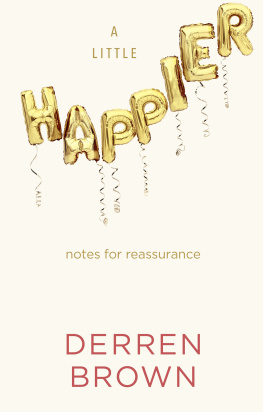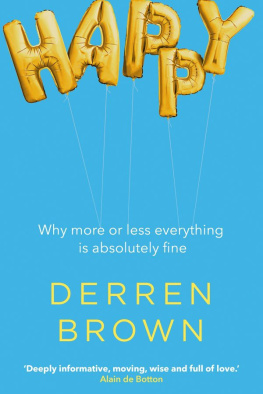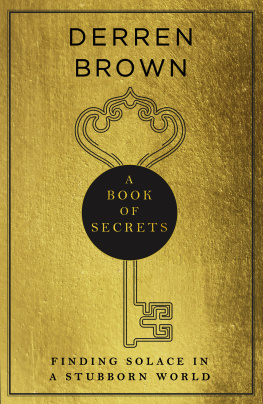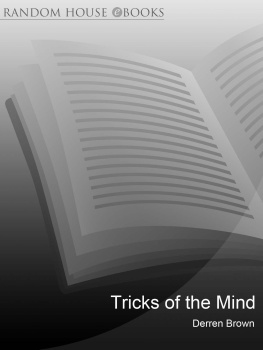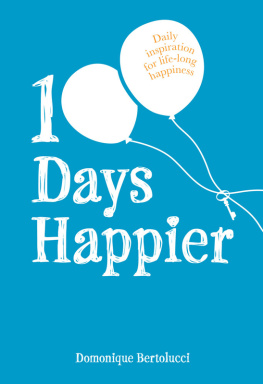
Derren Brown
A LITTLE HAPPIER
Notes for Reassurance

Contents
About the Author
Derren Brown began his UK television career in 2000 with his series Mind Control. Since redefining the genre of magic for intelligent, modern audiences, he has become synonymous with the art of psychological manipulation. His TV shows have become must-see events. He also tours the UK every year with a sell-out stage show and has recently finished a run on Broadway, NYC.
Derren is the author of five previous books: Tricks of the Mind, Confessions of a Conjuror, Happy, a book of his caricatures, Portraits, and Meet the People with Love, a collection of photographs.
Also by Derren Brown
Tricks of the Mind
Portraits
Confessions of a Conjuror
Happy
Meet the People with Love
For the Little Piglace
None of this is real
Happiness is perhaps the most elusive aspect of the human condition, although it masquerades as entirely straightforward. It seems as if it is something we should all have access to, and we are looked upon suspiciously if we dont possess it. Yet to chase happiness directly is a conspicuously self-defeating project.
This book presents a model for happiness that dates back over two thousand years, yet is pertinently modern. Many of the ideas here are in direct opposition to the tenets of the modern self-help industry, and most likely to our intuitions. Others may seem obvious, but in their cosy familiarity have lost much of their bite.
Im going to set out a model discussed at greater length in my book Happy. If youve read that book, I hope this will serve as a handy reminder of the fundamental ideas; it is perhaps a little easier to dip into. If you havent, I hope that once you have read this, the longer book might offer you a chance to explore the ideas here in more detail. The ancient model we are for the most part considering is Stoicism, which is perhaps the most effective approach to finding contentment that the human mind has conceived. No one school of thought should pretend to offer the answer to everything, but I do think Stoicism is of enormous use, whether we adopt it as a complete lifestyle or simply use it in doses where it can make our life a better, calmer, more robust experience. At points in our discussion I will talk about the potential drawbacks of Stoic philosophy and, throughout, embellish with other points that are not from their tradition but which I think are useful.
Lets begin with fiction. We live amongst an infinite data source. There are limitless things we could think about, or could pay attention to. To process all this information would be an impossibility, so how do we reduce it to something manageable? We tell ourselves stories. Stories about how the world works. About what people want from us, how things should be, how we should be, what we have to offer, how we relate to the world. And these stories allow us to simplify a complex and messy environment into something we can navigate; something that feels predictable enough to allow us to move forward.
The nature of good stories is that they have neat beginnings, middles and ends; cause and effect are precisely delineated; characters are clearly cut. Stories supply us with meaning, but to do this, they have to exclude much awkward information and confusing nuance that would mess up the neat narrative arc. As we form these kinds of stories about the world, they tend to become enormously compelling, and we emotionally invest in many of them. We forget that they are just stories, and mistake them for self-evident truth. When we listen to a friend talk about an ongoing conflict in which she is involved, the chances are we will quietly sense there is another side to the story that is not being told. Its probably hard for her to see this, but if she could if she could place her story alongside the stories of others and realise that her perspective is far from the whole truth we sense it might help her with her frustration. Our scepticism about her limited world view would be affectionate on our part. We forget to apply this same fond doubt to our own tales of whats going on around us.
To offer an analogy from my normal job: imagine youre fooled by a magician. The magician is exploiting our story-forming urge to make us join up the dots in a way that suggests the impossible has happened. We know there is a rational explanation so we are caught in a conflict which might be fun, or annoying, depending on what we think of magic tricks. But we are being shown that, however carefully we have been watching, we have unwittingly excluded some vital information. Or maybe weve watched too carefully, and missed the bigger picture. Things are going on we dont know about. The story we have been cajoled into telling is compelling but clearly inaccurate.
Stories, its been said, are things told in fire-lit clearings, surrounded by darkness. But all that darkness the bigger picture is rejected from the cosy scene, while we remain mesmerised by the comfort of the firelight. Our first step then is to recognise the existence of that mysterious, obscure world of information were simply excluding. This is important, as monsters lurk in the dark. When we banish information from our story of the world, it has a tendency to grow powerful, and to come back and bite us. Consider all the aspects of our own identities that we dislike and try to expel from our story of who we are. Buried into our unconscious, they can come to own us, as they feed into our addictions, avoidances and repeated relationship problems.
Lets prepare to listen to our internal dialogues a little harder, and catch ourselves in the act of telling stories we mistake for the truth, in the way an affectionate friend might. We can start to look out for too-tidy narratives that reduce complex truth to simple patterns, like those everyday niggles that so-and-so always or never does such-and-such. Or the times we decide we are helpless, based on previous experience, and become unnecessarily paralysed in the present. Or when we seem to be mind-reading: deciding we know a persons motivations for doing things that annoy us. The times we quickly catastrophise, and live out an emergency when we dont need to. These are all examples of unhelpful stories: we have told ourselves a tale of what events mean and, in that certainty, are making ourselves feel in some way bad. But it wasnt the event or the person causing the problem, it was only the narration we provided. This book will show you ways of improving that storytelling as it affects your relationship with yourself, events and others.
We mistake the horizon we see for the parameters of the world.

Be wary of goal-setting
Faith healers use a clever trick: after they have exploited the pain-killing qualities of adrenalin and had some poor soul bounce around on stage to show she is healed, they often tell her to throw away her medication. Faith alone, they assure her and the crowd, will maintain the healing. If the problem returns, it is her fault for not having enough faith.
Of course, the adrenalin wears off and the problem inevitably reappears, and now this sufferer has nowhere to turn. In fact, she must add her own failure before God and her peers to her existing list of problems. The healer, meanwhile, has moved on to the next town.
Next page
